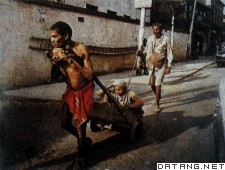1) scheduled caste


贱民问题
1.
The existence of scheduled caste is a special human rights problem in India.


贱民问题是印度历史上留存下来的特殊的人权问题。
2) pariah
[英][pə'raɪə] [美][pə'raɪə]


贱民
1.
Pariah system was a part of caste system of Hinduism, and the pariah was the people who were oppressed and looked down upon most in the traditional society of hierarchical discrimination of Hinduism.
贱民制是印度教种姓制度的一部分。
3) national problem


民族问题
1.
Dealing with the National Problem must Implement Religion Policy of the Communist Party of China Correctly and Overall;
处理民族问题时要全面正确地贯彻落实党的宗教政策
4) Peasant problem


农民问题
1.
Since reform and opening to the outside world,Deng Xiaoping paid particular attention to the countryside and peasant problem.
农民问题是马克思主义理论的重要组成部分。
2.
Antifeudal movement can not but mention the peasant problem.


反封建就不得不提农民问题。
3.
Peasant problem of the ruling area of Kuomintang the Period of liberation war is a universal social problem , it brings about a decisive influence for Kuomintang s destiny.
农民问题在解放战争时期的国统区是一个普遍性的社会问题,它对国民党的命运产生了决定性的影响。
5) livelihood issues


民生问题
1.
Starting from the evolution of the word of livelihood and its age content,the paper has expounded on ways of shouldering the social education function in building a harmonious society and solving the people s livelihood issues.
从民生一词的演变及其赋予的时代内涵入手,阐述了公共图书馆在构建和谐社会,解决民生问题方面是如何肩负起社会教育职能这一历史使命与重任的。
2.
For this purpose, livelihood issues should be given the whole society\'s exclusive attention.
民生问题是中国特色社会主义小康社会建设进程中的一个大问题,民生问题的解决程度、人民利益的实现状况不仅影响到社会主义和谐社会构建的进程,而且影响到国家长期稳定与健康发展。
3.
The early thoughts of vulnerable groups of Marx are of significance in implementing the scientific concept of development,improving people\'s livelihood issues as the focus of social construction,taking public services as administration concepts,taking fair justice as system construction idea,and solving the livelihood issues of vulnerable groups effectively.
马克思早期弱势群体思想对我们当下落实科学发展观,切实解决弱势群体的民生问题具有重大指导意义。
6) issue of refugee


难民问题
1.
The returning, arragement and emmigration of refugees in Germany has been the core and focus issue of refugee in Europe after WW Ⅱ.
德国难民的回归、安置和海外迁移问题,构成了第二次世界大战后初期欧洲难民问题的核心与焦点。
补充资料:贱民
| 贱民 Untouchable;Harijan 印度教4个主要种姓(即婆罗门 、刹帝利、吠陀和首陀罗)之外的劳动者。传统上被称为阿丘得,有的也称其为第五种姓。他们在不同的历史时期有不同的称呼,如受压迫种姓、外部种姓、哈里真或表列种姓。高级种姓的人认为,凡是身体排出的东西都是不圣洁的,而与上述东西有关的职业,如扫地、洗衣、理发、修鞋等都是不洁的职业,从事这些职业的人也被视为低贱和不圣洁的,是不可接触者。贱民在印度被剥夺一切权利,在经济、政治、宗教诸方面都受到社会的种种歧视。人们不接触他们,看一眼或接触其影子,都被视为玷污了自己。贱民为改变自己受压迫的状况,多次掀起反抗运动。1865年有温叠约巴特耶为首的改善贱民状况的运动,后又有欣泰、亨白德格尔领导的抗议运动,这些运动都产生了一定的影响。1914年德拉温高尔地区贱民又掀起争取宗教权利的斗争,并取得一定的胜利。1931年,因为英国政府把贱民从印度教徒中划分出去,给予单独选举权的决议 ,M.K.甘地进行绝食斗争,他把贱民改称为哈里真,即上帝之子。甘地成立协会在孟买举行会议,成立哈里真服务同盟 。在昌罕·马勒威耶的领导下,通过一项决议,决定印度种姓中不再以一个人的出身定为不可接触者,不可接触者和其他印度教徒一样享有进庙敬神、到井里汲水、上学读书、在公路上行走及参加公共团体等权利。1948年印度国会通过一项废除种姓压迫的议案,后又在宪法中作了保护他们利益的法律规定。各邦政府也制定了相应的法律。为了落实法律规定,有些邦还成立了委员会,专门从事此项工作,这些对改变贱民状况有一些促进,但种姓压迫仍然根深蒂固,贱民在内的各低等种姓阶层仍在不断地开展反对种姓制度的运动。
|
说明:补充资料仅用于学习参考,请勿用于其它任何用途。
参考词条
